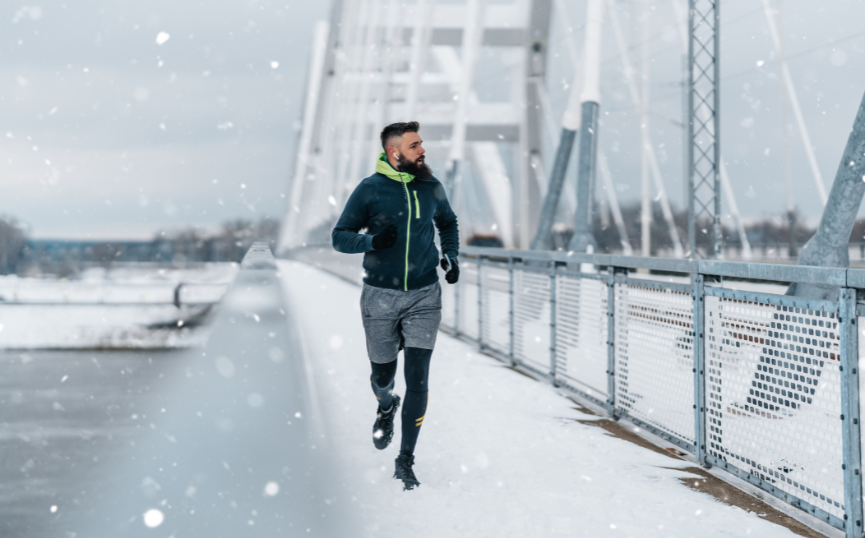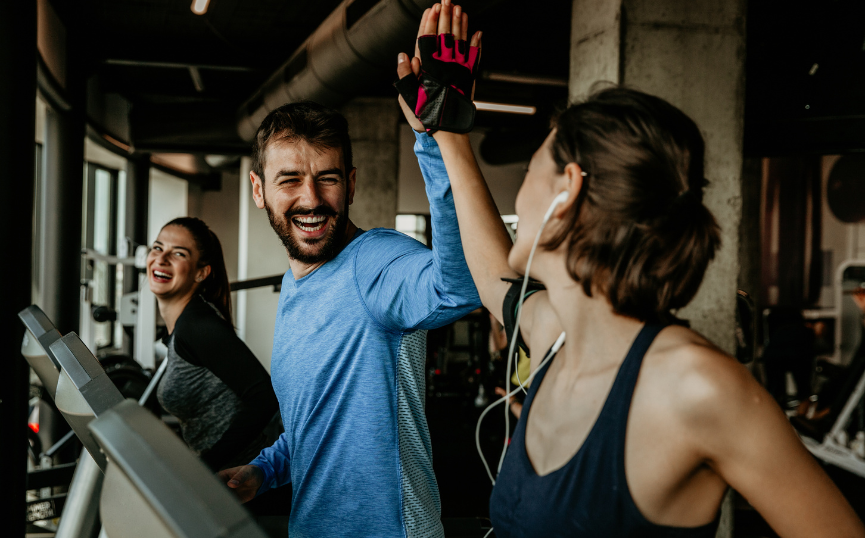Sport for mental health: How exercise helps stress management?
As the ancient Romans said, „mens sana in corpore sano”, meaning „a healthy body is a healthy soul”.1 Movement is a basic human need. In our view: with a little exaggeration, we are dead from the moment we lose our ability to move. Without muscles (or neurological connections) we cannot perform even the smallest activities. This is why strength, endurance and agility can take many different froms.

Some people may be able to exercise for long periods of time (running marathons, completing spartan challenges), but they may not be able to kneel for long periods or find it difficult to lie down on the floor to play with their child. Others may also be able to move inhuman weights, but may choke walking up to the third floor. There may also be some who demonstrate spectacular flexibility but have difficulty in strength training. Developing any of the above will lead to increased confidence, a sense of purpose and improved well-being.
I’m sure you’ve experienced the euphoria after a workout. It’s such a great feeling that it’s what brings most people back to the gym the next day. Sport also makes it easier to cope with the difficulties of everyday life. The mental effects of exercise can be so strong that exercise addiction can also be dangerous.
How exactly does sport affect the mind and what is the optimal training dose? Did you ever think that even 5 minutes of aerobic exercise is enough to feel the mental effects? What do you think is the best form of exercise that clears the mind the most?
In today’s article we look at some of the answers to these questions. But first, a little history lesson!
Sports have accompanied us throughout history
The original Yogatans unite ancient knowledge and ancient Greek philosophers were fond of extolling the benefits of sport. In the words of Socrates: ’A man has no right to be an amateur in physical training. It is a disgrace for him to grow old without having seen the beauty and strength of which his body is capable’.2
In the 1600s, a Renaissance physician Mercuriale summarised the Greek and Roman teachings on exercise in a book, with an explicit emphasis on the relationship between exercise and mental health. He perhaps the first to formulate the concept of physiotherapy.3
Mercuriale was followed by many philosophers and physicians, and slowly began to introduce/modify gymnastics as a subject in schools. Over time, professional associations and groups were formed and now there is a widespread belief that exercise is healthy both physically and mentally.
Scientifically: how can exercise affect the nervous system?
Several studies have shown that exercise can include chemical changes in the brain that can improve quality of life and stimulate learning.4-8 Several different pathways are responsible. Let’s take a look at some of them.
On the one hand, sport can increase the size and functionality of the hippocampus. The brain area called the hippocampus is part of the limbic system and is involved in memory and spatial orientation.
In addition, exercise can stimulate levels of hormone called BDNF (brain-derived neurotrophic factor).5-8 BDNF is responsible for making connections between nerve cells – these are called synaptic connections and are an integral part of memory processes. When we learn something new, unprecedented connections between neurons are formed, and BDNF is one of the hormones need to do this.
Both of these properties help us to feel better, but exercise also has specific hormonal effects.9-15 In other words, it has now been shown to increase levels of dopamine, which is responsible for motivation, serotonin, which causes euphoria, and noradrenaline, which is responsible for positive excitement. The triple action of the hormone will result in increased mood, motivation, attention, memory and learning ability.
Recent findings have found that the cerebellum is not only responsible for movement but also plays a dynamic role in cognitive abilities. This has been found to be the case in that when the cerebellum is damaged, cognitive abilities are impaired, not just mobility.15-16 Furthermore, the positive attributes of physical activity acquired in childhood are retained in adulthood. Thus, exercise in childhood can have neuroprotective effects in adulthood. This may be particularly important in individuals genetically predisposed to Alzheimer’s disease.17-24
The list could be extended further, as exercises increases the number of metabolic structures (mitochondria) in muscle cells. This number will not decrease again after the end of exercise. This means that in the last cycle of human life, cells are better protected against oxidative stress. In many cases, free radicals can „attack the body” because of inadequate metabolism, and the mitochondira play a key role in preventing this.25-26 Put simply, the health-promoting effects of a sporting past in youth can be felt in the last years of life.

Let’s look at the psychological aspects of sport!
We have good news for those who are play particularly prone to depression!27-30 Because of the hormonal effects mentioned above – releasing hormones that make you feel ’good’ – physical exercise can help prevent and treat depression. The most powerful drivers of this effect are endorphins, serotonin and dopamine.
Sport can cause endorphin levels to spike quickly, which can give us a rush of euphoria during exercise – often described as a feeling of flow – and then, as fatigue sets in, the hormone serotonin is released – this can cause the ’feeling of tiredness well and truly gone’ at the end of exercise. The dopamine released will carry us back to the gym for the next session.
But be careful with the dopamine hormone, because it can make you go crazy during your workout. Because dopamine is the hormone of the brain’s reward system. This mechanism’s main function is to reward us with ’feel-good’ for vital activities such as eating, sexual intercourse or even exercise. So the function of the reward system is to maintain life and species. Its over-activation, however, can lead to addiction.
So our main ’motivating’ hormone is dopamine. So stimulating dopamine levels is particularly useful for people with mood disorders and the unmotivated. If you’re struggling to find your inner inspiration to get through the day, start your day with some exercise, guaranteed. The stimulating effect of sport will last all day!
Let’s also look at the social aspects of sport!
Playing sport always give you a sense of community, even if you are training at home. Let’s see why?
Let’s say someone goes to a group class: even a very introverted person can open up after a while, because they become part of a team and take on the energy of the community. So he will open up to them.
My gym-going introverted friends – I am/was one of them – put away the headphones for a while and open up to the world! Observing conversations can also give you positive impulses. You don’t necessarily have to talk to everyone who goes to the gym, but if you’re particularly prone to depression, instead of listening to sad heavy music, pay a little attention to your surroundings. I guarantee you’ll recharge!
Do you exercise at home? I’m sure you’ve joined exercise/fitness related groups on social media too! To grow and learn, these virtual communities can also make you more open and inspired. If you haven’t joined yet and you’re hitting the ’home gym’, now is the time: find a workout group where you can read other people’s experiences or ask questions.

Let’s look at the impact of sport on stress management
There is a part of our lives that we cannot control. This is how much external stress our bodies are under, which we can of course avoid by hardly every going out, not surfing toxic social media platforms, choosing a quiet job and not raising children. But if we avoid all these things we will not live!
All the truly inspiring and ’good things’ in life come with stress. We believe in putting in the work, having children, using social media to learn and not being afraid of change! My personal favourite quote is ’fear is the mind killer’.33 I know few truer sayings. Fear kills action, it prevents us from moving (even fear of pain specifically physical movement). Fear of increased stress is an inherit part of our lives. So let’s change our attitude!
You have to learn to manage stress and one way to do this is to exercise. Exercise can improve our sleep quality.31-32 And improved sleep quality is an incredibly powerful stress hormone optimiser. Some recent studies suggest that even 5 minutes of aerobic exercise can improve sleep quality.32
So time is no excuse, people! Pro tip: if you really only have 5 minutes a day, do some intense interval training in the evening before you bathe or in the morning before you shower (the only problem with mornings is that, for spinal health reasons, you shouldn’t do intense exercise until 1 hour after you get up).
Sport also teaches discipline; in other words, it teaches you perseverance, commitment and how to deal with failure. These are exactly the human qualities that are needed to deal better with life’s difficulties. If sport makes us better able to cope with struggles, our stress hormone levels will also improve. So it’s a back and forth (mutually reinforcing) relationship.
Let’s watch the scale!
So sport is healthy in every way, but its effect on the nervous system is so strong that it can quickly become excessive. Excessive pressure to prove yourself, the pursuit of results and the constant search for euphoria in training can lead to injury. As can skipping rest.
To prevent training from becoming addictive, we need to let our nervous system relax, i.e. we need to take rest days. It is worth taking at least 2 days off training per week. Also, if health is the most important thing: do any kind of exercise for no more than 1.5 hours!
The movement most be nourished!
The chances of injury are greatly increased if our bodies do not get the proper nutrients they need to recover. Even if you want to commit to sport, you won’t need stacks of supplements, but you will need one or two essential supplements.
- A multivitamin to allow the biochemical processes to function properly and to eliminate the slightest chance of deficiencies.
- Omega-3, to reduce inflammation. Muscle aches after training? We love it, but it makes it difficult to achieve optimal performance the next time. Muscle soreness is associated with inflammation and excessive inflammation only impairs recovery. Inflammation is, of course, an essential process for the recovery of muscle tissues that have been strained during exercise, but its level must be kept optimal. Omega-3 fish oils help a lot in this.
- Creatine: if you’re into strength sports and have been training for more than a year, it’s worth investing in some creatine. This natural amino acid is uniquely involved in energy production and can stimulate the intensity of short bursts of effort. To find all about creatine, you can do so by clicking here.
- Protein powder: if you don’t consume 1.5 grams * kg (kilograms of body weight) of protein every day, your recovery will be hugely impaired. You don’t need significantly more protein than this, but chronic low protein intake can affect your well-being. If you can’t get this much nutrition on your own, use a high-protein supplement. The Vitamin360 range covers all dietary guidelines. You can find: dairy, dairy-free, lactose-free, vegan and beef protein. You can also choose from protein bars and protein fortified foods: pudding powders, instant coffees and desserts!


